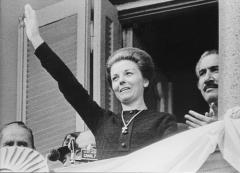Svetlana Alliuyena (Stalin's daughter) could maybe do it but you'd need to change much of her personality and convince Stalin to groom her. Maybe Stalin learns from Lenin's death and the subsequent power struggle that he should have someone ready to replace him should he die. He eventually settles on his daughter as she is the only person he can trust and she takes over after his death.
In a White victory scenario, Olga, Tatiana, Maria, or Anastasia could end up succeeding their father, if primogeniture doesn't favor their younger brother Alexei. Perhaps after winning the Civil War a cadre of military officers decide that Alexei is too sickly and that one of the sisters would be better if they are keeping the the Tsar as a political institution. The new Tsarina is more politically astute than expected and manages to play the rest of the government off of each other, leading to a complex situation where she is the power behind the council that is supposed to be using her as a puppet.
Alternatively, Kim Jong-il dies almost immediately after succeeding his father and Kim Kyong-hui (his sister) is the first to seize control.
